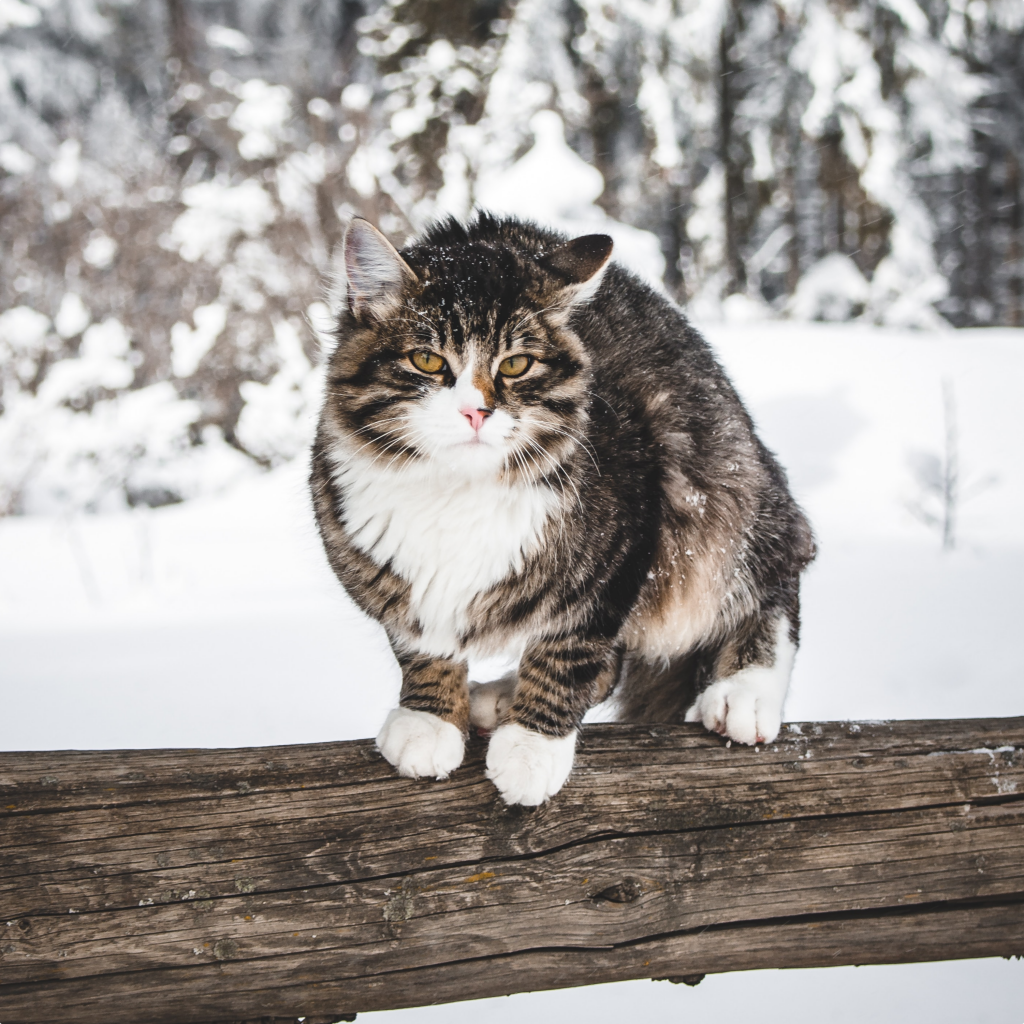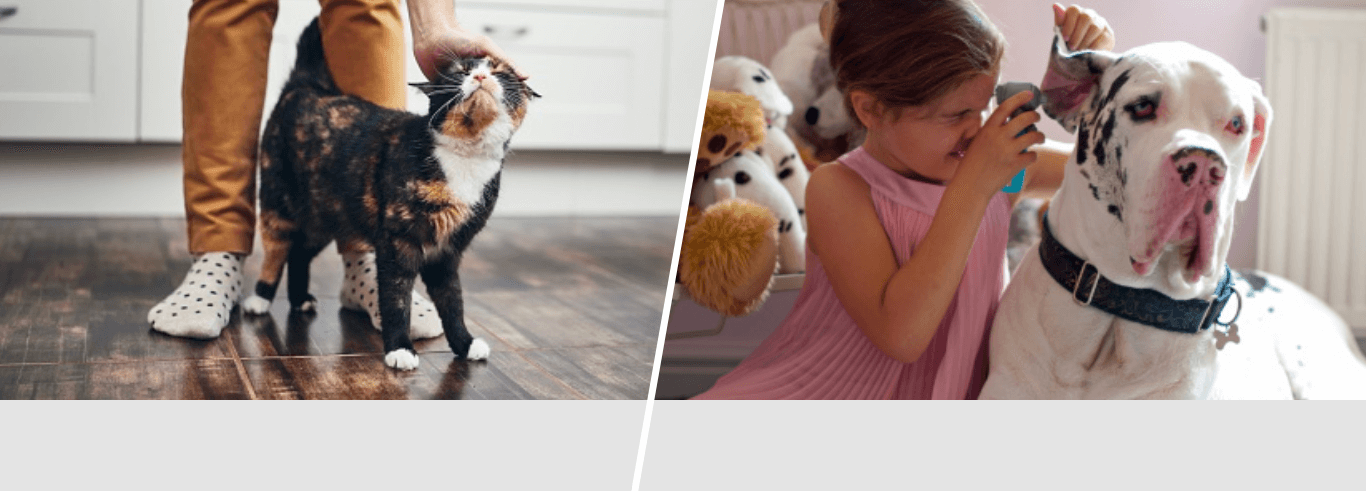Everything you need to know about your cat’s health this winter
Whether you have an indoor or outdoor cat, with the shorter days and colder weather during the winter, you’ll start to notice some changes in your cat’s behaviour.
But do cats feel the cold? Different types of breeds can withstand varying levels of cold weather. For example, Persian and Norwegian Forest cats have thicker and softer fur than a short-hair cat, which keeps them warmer for longer. Even if your furry friends are typically very capable of caring for themselves, winter time can be quite harsh, so you should monitor their time outdoors to help prevent the risk of them getting frostbite or hypothermia.

Hypothermia in Cats
Some of the most common symptoms of hypothermia in cats includes the following:
- Shivering
- Weakness
- Lack of awareness
- Muscle stiffness
- Short, shallow breathing
Frostbite in cats usually affects the tips of their ears, their tail, and feet which, as a result, may appear grey or pale in colour. To avoid this, make sure there is no snow or ice stuck to their fur or paws when they come back indoors. If you think your cat has frostbite or are unsure, take them to the vet immediately and follow further instructions.
Should I Keep My Cat Indoors During Winter?
If you’re looking to keep your cats warm and safe during cold weather, it is important to encourage as much time indoors as possible. Small cats have less thermoregulation and don’t tolerate the cold very well, while older cats may suffer from age-related diseases such as arthritis, weak immune systems or decreased muscle mass. In combination with the harsh weather, your cat may have difficulty facing the cold despite their desire to get outdoors.
If your cat is typically an outdoor cat, make sure to double-check your cat doors/cat flaps to ensure they haven’t been cemented by the cold and your pet still has easy access to get indoors.
It is also important to provide your cat with a litter tray so they have less inclination to go outdoors. Keeping them entertained with lots of toys can also distract them enough to stay indoors for longer periods of time.
What Temperature is Too Cold for Cats?
Whilst cats are feisty and generally take care of themselves, some cat breeds need a little more help during the winter months. Establishing what temperature is too cold for your cat varies depending on their age, breed and overall health, however the average temperature of 7°C is said to be too cold for cats, anything below this temperature can potentially lead to hypothermia.
Do Cats Feel the Cold Like Humans?
Cats are very adaptable animals, however they do feel a similar body temperature to humans, so if you’re feeling cold chances they are too. The ideal room temperature for cats in winter depends on their breed, age, size, and health. Broadly, the optimum temperature is somewhere between 25°C and 30°C – based on a cat’s natural body temperature, which is often between 38°C and 39°C.
It’s unrealistic for humans to keep their homes at the cat’s ideal temperature, but luckily cats can adapt comfortably to temperatures of 15°C to 20°C in the home.
Putting their bed near a source of heat can provide them with extra warmth to keep them safe and happy.
A well-padded igloo bed is an especially good option during the winter months because it is enclosed and will help your cat keep warm.
Do Cats Sleep More in Winter?
Cats become lazier during the winter, as they prefer to spend their time finding a warm place to sleep. To maintain their body heat, cats prefer small spaces and the “donut” position to get cosy. Unless your cat is elderly or requires assistance, try moving their bed up higher off the ground to avoid any drafts.
While outdoors your cat will seek out any warm place they can find. The engine compartment of a car or above the wheel can become a shelter for many cats in winter as it helps them stay warm. Before starting your engine, make a loud noise or bang on the hood of your car to warn any possible furry friends.
Do Cats Eat More in Winter?
While your kitty may be sleeping more, you’ve probably also noticed them eating more too. Whether they are an outdoor or indoor cat, the colder months require more nutrition because they’re now burning more calories to keep themselves warm.
You could try choosing between larger portions or more frequent feedings, instead of having a bowl of food always available, as free feeding can lead to your cat eating out of boredom and possibly lead to weight gain.
Don’t forget to make sure clean water is readily accessible indoors, especially if your outdoor bowls keep freezing.
Your cat may be eating more, but they’re still intolerant to festive flowers like poinsettias and lilies, therefore during the holiday season, you should keep them away from Christmas trees and tinsel to avoid them becoming ill and requiring a trip to the vet.
My Cats Health: What Should I Know?
You may be wondering if cats breed in winter and the answer is yes. Your feline friends are capable of breeding all year round. Cats typically go into heat during the summer months as the focus is usually to conserve their energy when it’s cold and to help their kittens survive winter. However, female cats that aren’t spayed often come into season over and over again, meaning they can be almost continuously on heat.
To debunk another assumption, if you’ve ever wondered “can cats have fleas in winter?”, the answer is yes. Fleas don’t hibernate, so if you see tiny bugs bouncing off your pet’s fur, it’s time to pull out the fine-toothed metal comb!
One of the biggest threats to your cat’s health in winter is antifreeze. Antifreeze is added to windshield wiper fluid during the winter months and while essential when it gets cold, the liquid is incredibly poisonous to your cat. The liquid tastes sweet and enticing to cats, but it is toxic. Consumption can result in nausea, vomiting, twitching muscles, unsteady walking, and an increased level of thirst and urination in your furry friend. If you suspect your cat has antifreeze poisoning, take them to the vet immediately.
Look after your cat’s health this winter and help protect yourself from vet bills all year round with Argos Pet Insurance provided by Pinnacle Insurance Ltd. Explore our cat insurance policies today.
References
[1] PDSA, 2018. https://www.pdsa.org.uk/taking-care-of-your-pet/
 Sorry, our lines are now closed
Sorry, our lines are now closed



